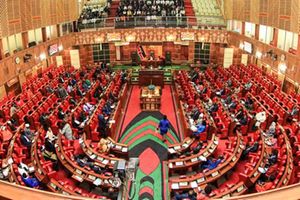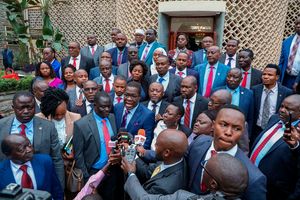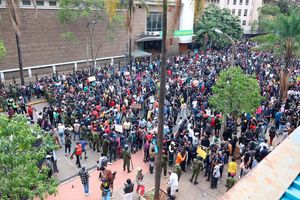
President William Ruto addresses the Nation from State House, Nairobi on May 3, 2024.
President William Ruto and his team of advisers are caught up in a delicate balancing act to find the best way out of the Finance Bill, 2024 stalemate that has triggered street protests.
The options are not only intended to assuage the public anger brought about by some of the tax proposals, but also to ensure smooth running of government.
This even as it became clear that the government will be forced to borrow more or increase taxation to finance the Sh3.9 trillion budget for the next financial year if the Finance Bill is enacted with the amendments proposed by the Finance and National Planning Committee of the National Assembly.
Alternatively, the government will slash the budget if it feels it can no longer increase the tax burden on the already overtaxed Kenyans or borrow more from the local or foreign markets.
The Finance Bill, which is set to be considered at the Committee of the Whole House, from tomorrow morning through to Thursday, had projected Kenya Revenue Authority (KRA) to raise Sh302 billion in additional revenue. This additional revenue is on top of the Sh2.95 trillion that the National Treasury projects KRA will collect in ordinary revenue during the 2024/25 financial year.
However, with the Finance Committee chaired by Molo MP Kuria Kimani having agreed to drop some of the tax measures in the Bill, the National Treasury is not sitting pretty.
Senior Counsel Paul Muite said there’s is overwhelming public objection to the Bill in its entirety.
“The Bill should be withdrawn, not amended, and re-published afresh without all the offending clauses,” Mr Muite told the Nation on Monday, adding that the Appropriations Bill should precede the Finance Bill.
Serious amendments
“The entire Bill should be withdrawn and replaced with a new one that reflects the views and approval of the Kenyan people,” former Imenti Central MP Gitobu Imanyara said on Monday, June 24.
Makueni Governor Mutula Kilonzo Jnr said the government must allow young people to express their concerns.
“I see no option, but for serious amendments and concessions on the Bill. Kenya is not migrating. We can sit and reason together,” added the former Senate Minority Leader.
Already, National Treasury Cabinet Secretary Prof Njuguna Ndung’u, in an advisory on June 19 to the National Assembly, has warned that the government stands to lose at least Sh200 billion if the Bill becomes law with amendments proposed by the Finance Committee.
“If the revenue raising measures contained in the Finance Bill, 2024 are not approved by the National Assembly, there will likely be a revenue shortfall of approximately Sh200 billion,” said Prof Ndung’u.
While the Constitution gives the National Treasury the power of the purse, budget making is a tedious, intensive negotiation process between the Executive and the National Assembly.
In the event that the MPs ignore Prof Ndung’u’s advisory and approve the unbalanced budget, President Ruto holds the ultimate decision on whether the country is ready for an expenditure that outweighs the revenue.
Once the House is done with the Appropriations Bill, 2024 that will ultimately allow government Ministries, Departments and Agencies (MDAs) to expend the sums as allocated, it will be sent to the President for assent.
Equally, once the MPs have passed the Finance Bill, 2024, it will be transmitted to the President.
The Finance Bill once enacted, gives the government the legal mandate to collect additional taxes to finance the budget.
Article 115 of the Constitution states that within 14 days after receipt of a Bill, the President shall assent to it or refer it back to Parliament with reservations in the form of a memorandum for reconsideration.
If the President refers a Bill back for reconsideration, Parliament may, following the appropriate procedures, amend the Bill as recommended by the President’s reservations or pass the Bill a second time without any amendments.
If Parliament amends the Bill fully accommodating the President’s reservations, the Speaker shall re-submit it to the President for assent.
“Parliament, after considering the President’s reservations, may pass the Bill a second time, without amendments or with amendments that do not fully accommodate the President’s reservations by a vote supported by two-thirds of the members of the National Assembly,” the Article reads.
There are 349 MPs in the National Assembly, meaning that at least 233 MPs are needed for the House to veto a presidential memorandum containing his reservations on a Bill.
But if the President neither signs the Bill nor returns it to the House for reconsideration, the Bill shall become law on its own motion on the 14th day from the date it was transmitted to him for assent.
Balanced budget
“If the President does not assent to a Bill or refer it back to Parliament within 14 days of receipt or fails to assent to it within seven days of consideration of his reservations, the Bill shall be taken to have been assented to on the expiry of that period,” the Article reads.
Therefore, if the President feels the two Bills have no room for a balanced budget, he has the latitude to refer them back to the House while raising his reservations in the form of a text on how the areas he wants amended should look like.
In 2018, then President Uhuru Kenyatta declined to sign the Finance Bill, 2018 and returned it to the House with a memorandum after MPs had amended it to exclude the imposition of 16 per cent VAT on fuel products.
The President’s memorandum sailed through after the MPs failed to raise the requisite numbers to reject it.
In the history of the Kenyan Parliament under the 2010 Constitution, MPs have never raised the required numbers in the House to veto a presidential memorandum on a Bill.
According to the Public Finance Management (PFM) Act as amended in line with a court judgment of 2018, the government cannot appropriate what it does not have.
This means that the Finance Bill must be enacted first so that it is clear what the government will collect before the Appropriations Bill, which simply means estimates, is enacted.
The two Bills have a deadline of June 30 to be passed and by July 1, they should have been signed into law to take effect.
The country’s financial year starts on July 1. Previously, the Appropriations Bill would be passed first, by June 30.
The Finance Bill would then follow — within 90 days of the passage of the Appropriations Bill — which was by September 30.
The net effect of Prof Ndung’u’s reservations is that the budget will not balance as the expenditure side outweighs the revenue side.
The Finance Committee will be proposing changes to delete the imposition of 16 per cent VAT on bread and 25 per cent Excise Duty on crude edible and refined oils.
The committee also wants the proposed 2.5 per cent motor vehicle circulation tax charged at the rate of the value of the car deleted from the Bill.
The committee further seeks to have financial transactions excluded from 16 per cent VAT even as it moved to have the introduction of Eco levy at the rate of Sh150 per kilogramme only applicable to imported goods.
However, MPs led by John Mbadi (nominated), believe this levy will make the cost of sanitary towels for girls and menstruating women and diapers for babies and adults among others, to skyrocket.
“The committee should have been intelligent enough to know that diapers and sanitary towels are largely imported and therefore, introducing Eco levy in the country serves to make them even more expensive than they have been hitherto,” says Mr Mbadi.
To ensure that the government does not totally lose out on projected revenue from the Bill, the committee wants the Road Maintenance Levy (RML) increased by Sh9 per litre of fuel from the current Sh18 to Sh27.
The committee also wants the Import Declaration Fee (IDF) increased from the current 2.5 per cent to 3.5 per cent.
But even as this obtains, Prof Ndung’u, in the advisory to the National Assembly is proposing budget cuts that will affect key development projects and service delivery in key sectors.
Dangerous grounds
However, Minority Leader Opiyo Wandayi, the Ugunja MP, accused the CS of usurping the role of Parliament with his proposed budget cuts
“Prof Ndung’u, who is not elected by anyone in this country, is purporting to direct this House and therefore treading on very slippery and dangerous grounds. Purporting to dictate to the House on what it's supposed to do is unconstitutional,” protested Mr Wandayi.
“The CS is also anticipating debate because as far as I am aware, this Bill hasn’t been enacted. The CS’s actions therefore, fly in the face of the constitutional provisions and separation of powers,” said Mr Wandayi.
The biggest losers as per the National Treasury’s expenditures cuts warning include State Department for Energy that will lose Sh21.8 billion which will affect last mile connectivity for constituencies and other interventions to completion, including metering (Sh14.5 billion), last mile connectivity (Sh4.6 billion) and street lighting (Sh2.7 billion).
The Teachers Service Commission (TSC) could lose Sh18.9 billion that was to be used for confirmation of teacher interns to permanent and pensionable terms and hiring of contract Junior Secondary School (JSS) teachers, the State Department for Roads would lose Sh15.1 billion that will affect the ongoing roads projects in the country and NG-CDF would lose Sh15 billion.
The National Treasury is poised to lose Sh12.7 billion that will affect Kenya Revenue Authority (Sh4.7 billion), pending bills (Sh5 billion) and Kenyan Airways, Civil servants Insurance Scheme, Equalization Fund Arrears at Sh1 billion each.
The State Department for Water will lose Sh11.6 billion for various irrigation projects.
The State Department for Higher Education and Research will lose Sh8.3 billion, while the Ministry of Defense will lose Sh7.8 billion.
County governments are set to lose Sh5 billion, Parliament (Sh3.2 billion) and the Judiciary (Sh2 billion).
The Division of Revenue Act states that in case of a shortfall in revenue collection, the deficit shall be borne by the national government.








